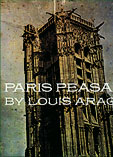The gods of a people arise from the material circumstances of land, climate, and ecology which belong to that people — and from these material circumstances a set of values is then created which seems to 'go with the territory'. The derivation of these values is subsequently forgotten, and they are inscribed on the territory permanently as eternal values. But eternal values, whether emanating from Jehovah, Jesus, or Plato, did not descend directly as voices from heaven, but were created by men.
Modernity has not yet discovered its proper gods. It still believes in the gods of other peoples, which no longer apply in our epoch. The surrealist writer Louis Aragon, embodying the creative spirit of the age, wants to replace the transcendent gods of Old with the terrestrial gods of the Present, and thus relocate the ground of cultural critique away from the timeless aesthetic / moral pursuits of theatre and politics into the places which shape thought on a daily basis — the movements and practices of hairdressers, prostitutes, café customers, and shop owners.
Through a series of walks interspersed with reflections, Aragon describes the Passage de l'Opéra, a Parisian shopping precinct which is soon to be demolished. In a highly patronising tone, he laments the loss of the Passage's inhabitants — "the shoeblacks who keep on rubbing away at shoes which are already throwing off dazzling reflections", "the hairdressers who betray through unexpected refinements an instinctive anatomical knowledge", and the charming, barrel-seated cafés where the Dadaists and Surrealists held their meetings.
In the second chapter Aragon and his friends go to a park on the outskirts of Paris, the Parc des Buttes-Chaumont. They sneak into the park at night claiming that the collective unconscious of Paris resides here. They spend fourteen pages discussing the inscriptions on statues, but neglect to mention any of the park's essential features. They encounter the famous 'Suicides Bridge,' whose rate of attrition was reduced to nothing overnight when the authorities erected metal grilles over the abyss ("just see how docile people turn out to be: nobody any longer jumps off this easily negotiable parapet").
So what is this book about? Well it isn't about the places where the Divine manifests itself in Modernity. That was just a lie that Aragon told the editor of La Revue Européenne as a joke to see if he would publish what Aragon wrote (and he did... he also published the mocking letter addressed to him in the second chapter).
It is tempting to think of the book not in terms of its explicit content but as a kind of 'thought-movement' — the interior space of the Passage, stimulating the eye above the other senses, represents consciousness, whereas the the Parc, wild and untamed, represents the unconscious liberation of desire. There is probably enough material in the book to sustain this theory but it still feels like clutching at straws.
The best answer I can give is that the book appears to have a destructive aspect and a creative aspect. The destructive aspect is a Dadaist anti-art which wants to hobble and distract the reader at every opportunity — and which rails against the empty abstractions of state philosophy, which derives everything from an original Principle, relates everything to an Ideal, and unifies Principle and Ideal in a single Idea (God or metaphysics). The creative aspect is an expansive Surrealist praxis — "the immoderate and impassioned use of the narcotic image... the uncontrolled provocation of the image [which] infects the domain of representation, capsizing its simple equivalences."
To some extent this is what Paris Peasant does but it isn't exactly enjoyable.

